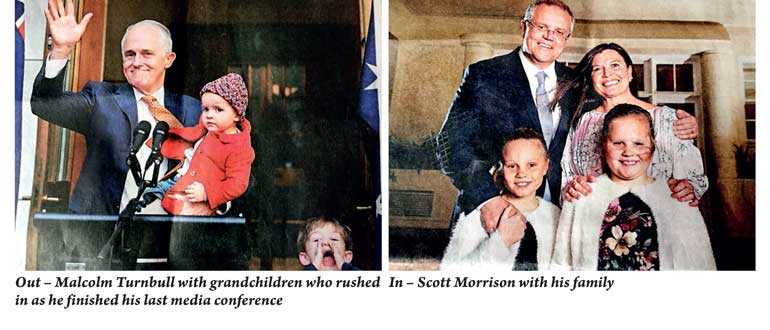Sunday Feb 15, 2026
Sunday Feb 15, 2026
Saturday, 1 September 2018 00:00 - - {{hitsCtrl.values.hits}}
 Three years ago all eyes were on Canberra because of the crisis within the ruling Liberal Party. Prime Minister Tony Abbot was replaced by Malcolm Turnbull as Party leader and Prime Minister. It was history repeating itself when one week ago, Turnbull had to move out and a new leader, Treasurer Scott Morrison took over.
Three years ago all eyes were on Canberra because of the crisis within the ruling Liberal Party. Prime Minister Tony Abbot was replaced by Malcolm Turnbull as Party leader and Prime Minister. It was history repeating itself when one week ago, Turnbull had to move out and a new leader, Treasurer Scott Morrison took over.
“Scott Morrison has outsmarted and out-muscled his opponents to come through the centre and seize the prime ministership - smashing the great conservative revolt, thwarting the Peter Dutton bid for office and repudiating the demand for a radical shift to the Right,” wrote Paul Kelly, Editor-at-Large of ‘Weekend Australian’ the day after the new prime minister was sworn in.
Describing Morrison as “a grassroots politician, instinctive, bred into the party,” Editor Kelly calls him a born political animal, aggressive and a warrior.
Electronic media had a field day (several days, in fact) with political analysts keeping track of what was going on. In addition to virtual ‘ball-by-ball’ commentary on what was going on in the Parliament premises, there were continuous interviews with MPs and Senators as well as scholars and others well-known in the political arena.
Meeting the media for the last time as prime minister, Malcolm Turnbull was calm and collected. He didn’t mince his words when he said that the public would be “dumbstruck and appalled” by the recent events. The happenings were due to an “insurgency, deliberate, destructive action,” he said.Australia has cemented its reputation as the coup capital in the world,” is how Troy Bramston, Senior Writer of ‘The Australian’ interpreted the government crisis. “No country has routinely deposed its political leaders, state and federal, more than we have during the past few decades. We regarded by many countries not only as a laughing-stock but as one with unstable government.”
Australians will eagerly watch how the new prime minister will perform. At a time when a severe drought has affected the farming community, after assuming office Morrison said that his immediate priority will be drought, followed by electricity prices and healthcare – issues that had been continuously debated. He is committed to a strong economy, national security, to keep Australians safe and keeping the country together and united.
In recent history, not a single prime minister has been able to run a full term. In each of the last four parliamentary terms the prime minister has been deposed buy an internal strife – Kevin Rudd in 2010, Julia Gillard in 2013, Tony Abbot in 2015 and Malcolm Turnbull in 2018.
The first two were from the Labour Party and the other two Liberal. The last prime minister to complete a full parliamentary term was John Howard (Liberal 2004 - 07). Australia has had six changes of prime minister in the past 11 years. Morrison is the fifth prime minister in five years. He is the third Liberal prime minister in three years. He is Australia’s 30th prime minister – Liberal Party’s 14th. Australia has two House of Parliament – the Senate (76 members) and the House of Representatives (150 members), both with elected members. Members to the Senate are elected from the six states (12 from each state) and two each from the Northern Territory and the Australian Capital Territory. Members to the Lower House are elected from single-member electoral divisions (electorates). The full House of Reps and half the Senate are dissolved once every three years and elections held.